Nassiriya: Alarms ignored before Carabinieri massacre. Veteran Hero tells Tragedy (video) and Calvary without Military Honors
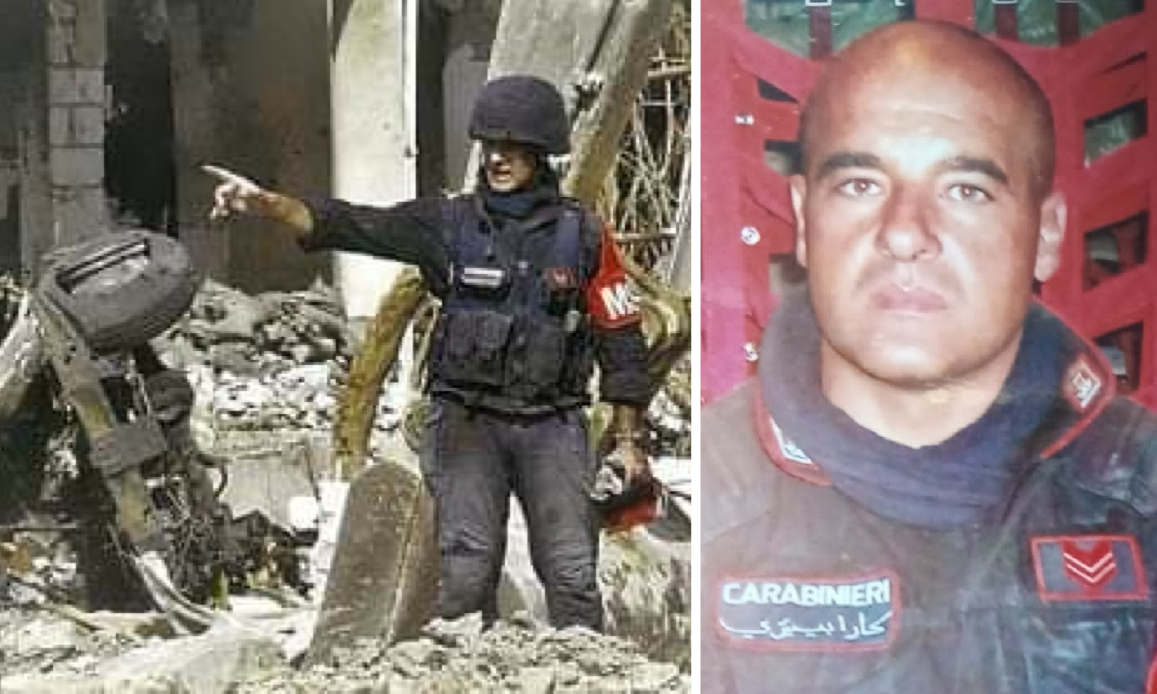
November 12, 2003 – first published on November 12, 2020
by Fabio Giuseppe Carlo Carisio
Versione originale in Italiano
«The victims of Nassiriya would have been entitled to the decorations and honors provided for the war dead because it is known that what happened happened in an operational theater of war. In order not to admit responsibility, none of this was granted. Who is recognized as having severe post traumatic disorder, as the Americans first did after Vietnam, it is up to the recognition of veterans. But the real situations of psycho-physical damage were not recognized by the military administrations for a “team order”: otherwise they would have been invaded by requests for benefits. It is said that the Carabiniere becomes a hero when he dies. While the military soldier thinks above all of bringing home the skin. The sacrifice of Nassiriya allowed the leaders to fill their mouths talking about “martyrs, saints, heroes” only, instead they forgot us».
Deputy brigadier on leave Pietro Mario Innocente Sini, 56, from Porto Torres (Sardinia) is a war hero. But for the Italian State he is only a Victim of Terrorism awarded the Gold Medal like other colleagues who did little or nothing on that tragic morning of November 12, 2003: when a GMC truck with a tank filled with about 300 kg of TNT ( immersed in diesel fuel to conceal it), exploded in the Maestrale barracks of the Carabinieri Battalion of the Ancient Babylon Regiment in Iraq.
Together with other colleagues he was in the entrance of the military base in Nassiriya when the explosion devastated an entire building and seriously damaged another, causing 28 deaths, including 19 Italians (including 12 carabinieri and 5 Army soldiers) and 9 Iraqis, and 58 wounded.
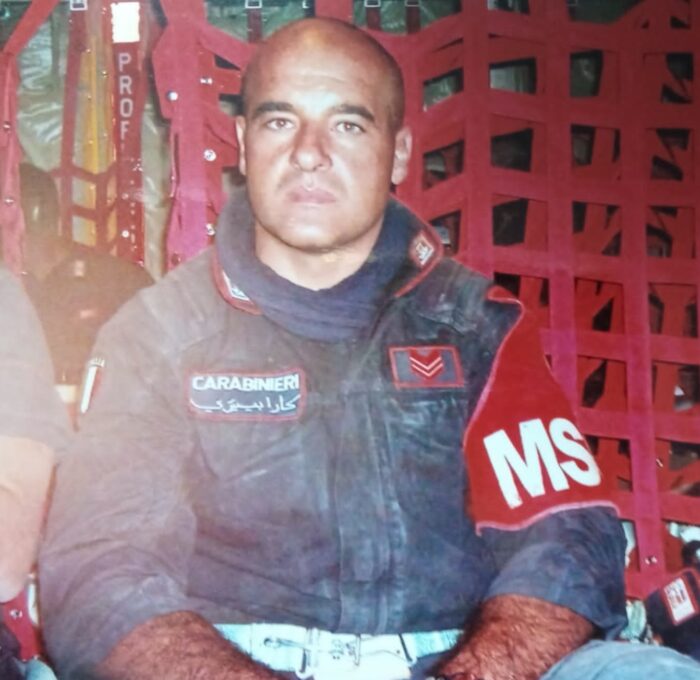
The shock wave sent his Jeep flying twenty meters away. But as soon as he recovered from multiple traumas, he got out of the car and went in search of his injured colleagues, taking them out of that hell of smoke, rubble and bloody shreds of bodies. His image in the debris has been around the world and is the brightest medal earned in the field by a real soldier who may well be considered a hero but, for the hypocritical Italian Republic, has become an uncomfortable survivor.
In fact, it was his testimony that helped to lift the lid of the hidden truths on that jihadist kamikaze attack. He did so during the military trial which ended with the acquittal of all the defendants and then the civil one in which the commander of the Italian mission, General Bruno Stano of the Italian Army, was sentenced by the Court of Appeal of Rome to compensate the families of the victims for having underestimated the danger despite repeated alarms about the imminent attack. Colonel of the Carabinieri Georg Di Paoli, direct commander of the soldiers of the Meritorious Army, was acquitted instead.
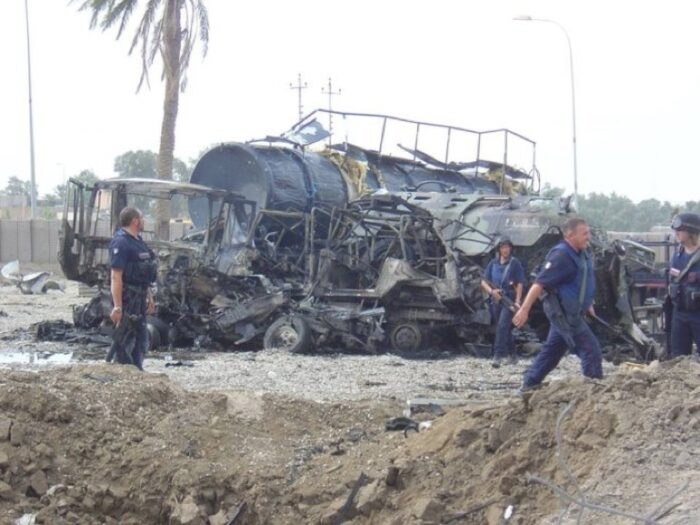
The alerts on the concrete risk of an explosive truck were intercepted by SISMI (military intelligence) as by the patrols of the same PET (Police Evaluation Team) of the Traffic Police, the information and training unit of the Carabinieri of which Sini himself made part, intended to collect sensitive information and train Iraqi policemen to control the territory. His words reconstructed the state of alarm prior to November 12 that was not in the records because the ‘X-files’ of the daily Patrol Reports had all been destroyed in the explosion and subsequent fire. Or at least this sustained the headquarters of the weapon without obviously the possibility of counter-verification.
From that day on his second calvary began: the professional and moral one which was added to that of the daily psycho-physical disorders. In fact, 17 years after the tragic event, the first hearing before the Labor Judge is still waiting for the seriousness of the biological damage resulting from that kamikaze attack to be recognized.
On 2 June 2020 in the Prefecture of Sassari he accepted the Gold Medal as Victim of Terrorism after having previously returned it in a provocative gesture to bring to the attention of the media the scandal of these fallen soldiers and survivors left without honors by the Italian Republic who wastes annuities for even corrupt politicians and then sips the economic benefits to the true Servants of the Fatherland and to the families who have cried and died or share the suffering.
His truths about Nassiriya that begin with a return to hell. The memories of the military mission, of those dramatic moments of the explosion and of the aid to the wounded comrades. In other reports we will give space to the anger of some widows who have had to rely on lawyers to get justice.
THE MILITARY CONTEXT IN IRAQ
«The military compound of Nassiriya was composed of two Italian military bases. The Command of the Carabinieri Regiment of the MSU Antica Babilonia in the Libeccio barracks and the Command of the Battalion in the Maestrale (Mistral) barracks (nicknamed Animal House) which was about a hundred meters as the crow flies from the other bank of the Euphrates river that crosses the center of the city, connected by the Bridge of Olives».
«It was a 100% military operation even if with a humanitarian purpose of Peace Keeping within the UN that authorized the mission on July 15, 2003 with resolution 1483. But if you show up with long guns, guns and crawlers, you are still seen as an invader. People are not all illiterate, there are very prepared people who knew that it was not a totally peace mission. We Italian Carabinieri arrived in Iraqi territory while the American troops were still in the middle of the war, so we were associated with an invading military command. For this reason we will never remove the doubt that there may have been local coverage and complicity of the attack».
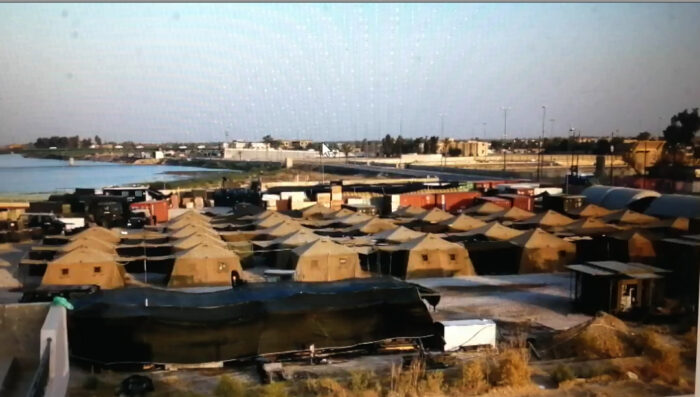
Nassiriya was a fundamental logistic point for the US Army which had its multi-force operational base in Tallil about 25 km from the city, where previously there was an important Saddam Hussein military airport, between the American operations center of Baghdad and the Camp Wolf Joint Force Base in Kuwait City. The Carabinieri Maneuvering Unit was made up of the Traffic Police, with training information tasks, Custom Police, for monitoring commercial and financial activities, and Local Police, with ordinary patrol function of the territory. They were wards integrated with Iraqi policemen. Tallil had a very important religious significance because the temple of the Zigurat, built in the ancient Babylonian period, was considered the house of Abraham and therefore the fulcrum of the lineage of all the Abrahamic tribes.
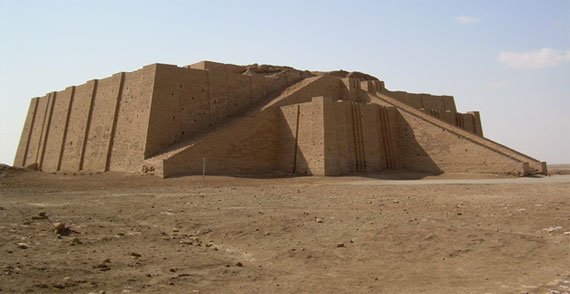
«The Italian command depended on the United Kingdom Division of Basra in turn commanded by the Operations Center of the US-led Coalition, but in reality we had much more frequent relations with the Americans who with their HMBs, the Hammer armored vehicles with heawy weapons, they never stopped patrolling the squares of Nassiriya even after our arrival – recalls Sini – While the American bases could not even be approached, we, however armed and in possession of passive and active tools, were the “good guys” who conversed with the population: we offered care to local families thanks to the Italian Red Cross, we trained Iraqi policemen, the children came to the base with satellite phones to allow us to call home at one euro per minute. But we even paid for our major investigative work. The USA also knows the power of the Carabinieri to offer health care, food aid and friendship but at the same time create an intelligence network. They had a good command of the CIA, our secret services worked but we too managed to get the information by doing well».
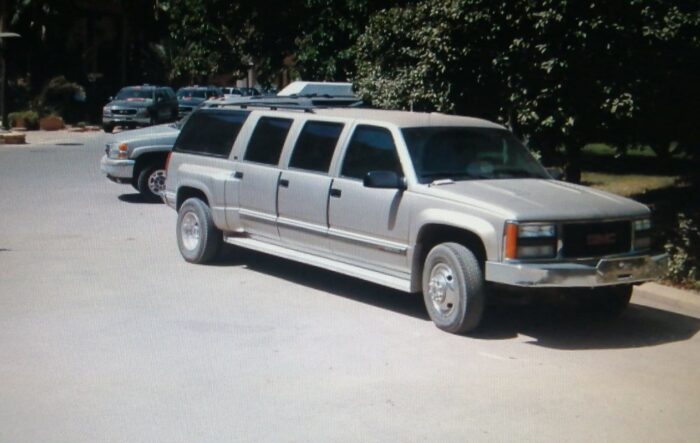
The movie “Nassiriya, not to forget” lingered a lot on this humanitarian action and on the commitments to increase water supplies thanks to the role of the actor Raoul Bova (made famous in the role of the carabiniere Captain Ultimo in the fiction about the mafia and the capture by the Sicilian boss Totò Riina) and to the production of Pietro Valsecchi who, as we will see, played an important role in revealing the background of an avoidable massacre.
THE MORNING OF THE MASSACRE
«We were hit at the exact moment we were weakest. They had probably learned that there was a personnel change phase and therefore they realized that it would be easier to organize an attack. Since our mission had ended, all the protection devices as long weapon (Beretta AR 70 semi-automatic), helmets and bulletproof vest had already been delivered for departure. My patrol was one of the few still armed».
It was precisely this circumstance, in some way, that saved the life of the then pinned Pietro Sini, his patrol chief marshal Giorgio Cucca and his colleague Antonio Lupatin. The survivor’s story is as precise as it is still distressing after so many years.
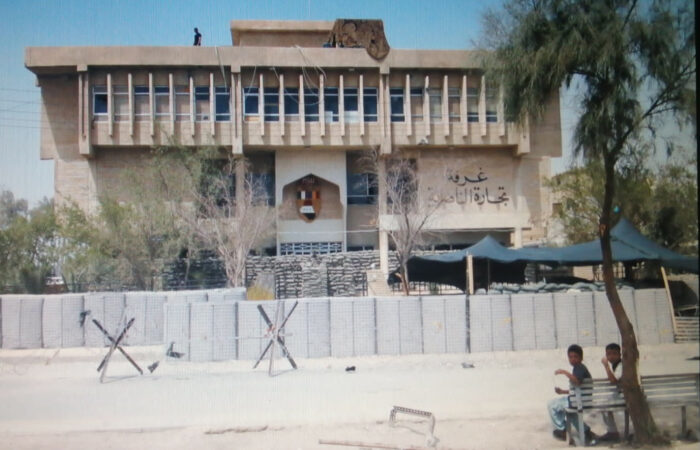
«At 8 am we leave the base and greet the guard on duty as usual, after checking that the police device was in place. We went to the Libeccio base for a coffee and there we found another Custom Police team made up of Marshals Fregosi, Trincone, Ragazzi and Bruno and we exchanged a series of jokes. In the context the telephone rang: it was the central asking if Marshal Fregosi was there. I called him: “they want you on the phone”. After a few minutes he closed the conversation, approached us and said: let’s go to base, the Sassari guys are coming, with the directors. But he repeated that the orders for that morning were not to come to us … Who knows why! ».
The Sassari Brigade of the Italian Army, in fact, was located in the White Horse barracks outside the city. There had arrived directors who had to study the context to make the fiction for Taodue RTI (Mediaset group) but who had been advised against the movements given the previous alarms. Among the civilians who will die that day there were also the director Stefano Rolla and the international cooperator Marco Beci together with the Army’s soldiers who had escorted them : captain Massimo Ficuciello, chief marshal Silvio Olla, first corporal major Alessandro Carrisi, chief corporal chosen Emanuele Ferraro, corporal major Pietro Petrucci. In addition to the 11 carabinieri (names below).
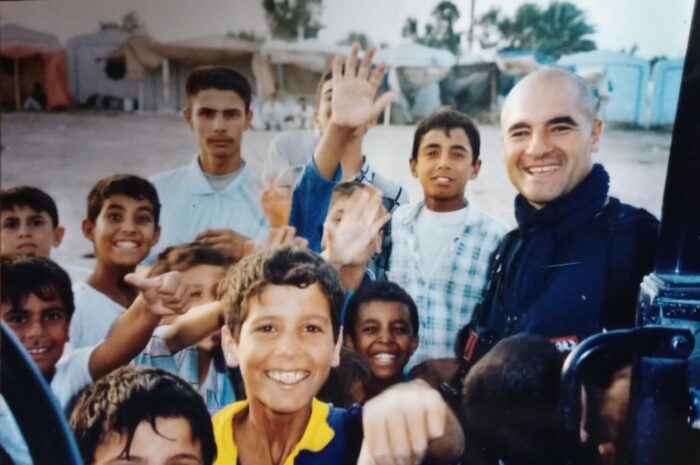
«I was sitting in the front of the Jeep Land Rover Defender when my team decided to stop at the head of the bridge to talk to the Traffic Policemen. The Defender led by Marshal Bruno comes alongside and Marshal Fregosi asks me “what are you doing?” – Sini recalls – “I’m giving these children some milk, biscuits and water”. They walk slowly towards the base and wait at the entrance. The carabiniere on guard at the bar, Andrea Filippa, lets them in. We arrive too and there the “great” Fregosi was waiting for us. But in the meantime we had decided to visit the Commander of the Traffic Police, Colonel Rahym (Iraqi – ed) who had invited us to dinner for the evening of the 11th. Marshal Ragazzi was on the left of the entrance and was talking to Marshal Trincone, while Marshal Bruno was parking in the Land».
It is 10.40 in Iraq, 8.40 in Italy. «Hi colleague. I begin to walk away maybe one, two or three seconds … An impressive metallic roar. A frightening mechanical push. The Jeep takes off and is thrown about twenty meters away and goes off… We didn’t even understand what had happened! It is all a case of debris falling from the air. I thought it was over».
INHUMAN SCREAMS AND BLOOD’S AIR
«I got out of the vehicle and realized the base was on fire, for what was left of it! I knew there were several colleagues inside. I started the Jeep and ran towards the perimeter of the base, flying down into that hell of thick smoke. I heard screams: they were Marshal Lucchesi and his colleague Marco Pinna, both wounded. Lucchesi had got the worst of it. I showed Pinna the way to go. I loaded Lucchesi on my shoulders to take him to a safer place. I did not hesitate to launch myself inside and asked my colleague Lupatin to find some fire extinguishers to be able to go upstairs. Nothing could be seen while inhuman screams were heard. There were a series of detonations and various bursts of bullets in the structure and I don’t know how I avoided them: the ammunition barracks had burned down!».
«I see a silhouette in the center of the staircase: it was Marshal Iacopini. I try to secure her by entrusting her to colleague Lupatin outside the base. I decide to go up and in total darkness I find Marshal De Rasis seriously injured. He is a “Christian” over 1 meter and 80 tall and weighing 120 kg. I load him on my shoulders as I walk the safest route we fall off the wall and try to avoid the worst in De Rasis. I get up and go outside. I ask the people present to give me a hand: the smell of blood has permeated the air too!».
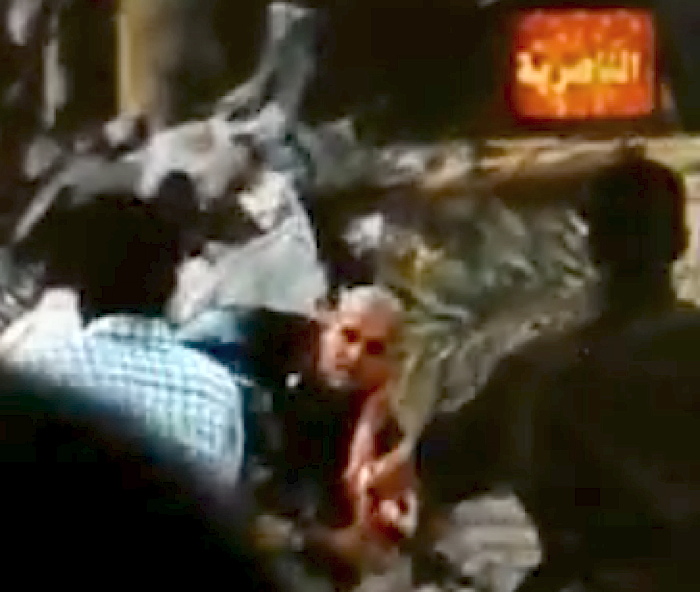
«I decide to go back inside the base: the smoke is king. I take a gas mask from a lieutenant and go to the upper floors where I find other corpses: Marshal Giovanni Cavallaro is lifeless in the cot. My thoughts go to the guards on the roof who passed out during the explosion (carabinieri Stefanelli and Calderone). One by one I accompany them to the lower floors making them wear the gas mask. I made several forays inside to look for colleagues. At the entrance to the base there were several corpses and shreds in the rubble. The recovery of the bodies began: no one felt like it. I took courage and with the Red Cross staff we started to photograph and identify the victims before placing them in the black bags».
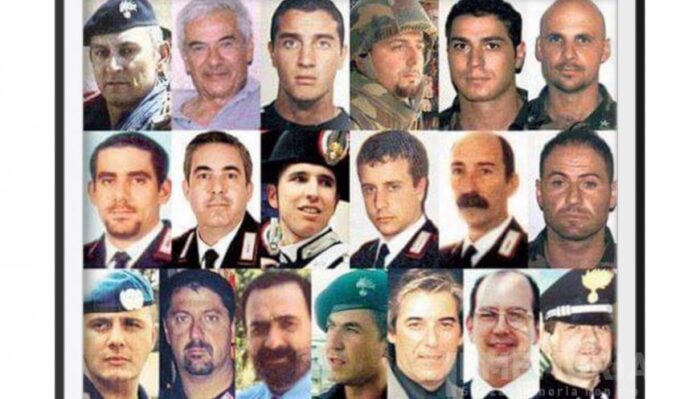
THE CARABINIERI FALLEN: assistant marshal Massimiliano Bruno, second lieutenant Giovanni Cavallaro, brigadier Giuseppe Coletta, corporal Andrea Filippa, marshal lieutenant Enzo Fregosi, chief marshal Daniele Ghione, corporal Horacio Majorana, brigadier Ivan Ghitti, deputy brigadier Domenico Intravaia, assistant sergeant Filippo Merva , Alfio Ragazzi, assistant marshal Alfonso Trincone.
ALARMS IGNORED FOR DAYS
After spending a whole day recovering human remains, the survivor-hero Pietro Sini returns to Italy on 13 November with a military flight to Ciampino. Not only is he psychologically traumatized by the tragedy but he has caused a severe knee sprain to save his brawny injured colleague. The other traumas will come out week after week. It will take years, however, for the truth to emerge about the ignored alarms in a conspiratorial climate that, unsuccessfully, has tried to envelop even the same corporal.
«Before calling us to testify in June 2007, the Military Prosecutor of Rome heard the deposition of the film’s producer on Nassiriya, Pietro Valsecchi, since the fiction had triggered a series of answers that were missing, revealing secret things he had assumed thanks to contacts with the veterans. When I was called to testify I was still on duty in the Army and my Company commander asked me if I was really sure I wanted to testify. But I could not refuse … My testimony was very annoying because I brought to light the story of November 8 that was not in the records. In fact, the Prosecutor had not received any of our daily Patrol Reports on the grounds that the file archive on the server had been destroyed during the explosion and fire».
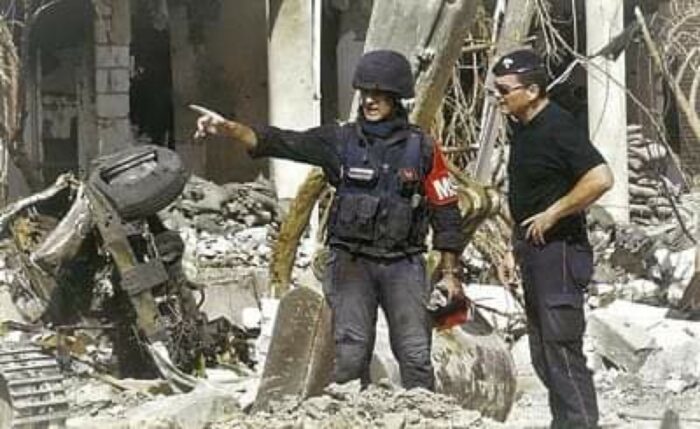
Already in October 2003 an Iraqi sergeant of a seconded command had asked to meet the Carabinieri with some urgency. He had become our friend because thanks to a report to the staff of the Italian Red Cross present in the base of the Italian Army, a seriously ill family member was treated.
«He wanted to return the favour. My cell chief marshal Giorgio Cucca compiled a Patrol Report indicating point by point what the sergeant had heard “soon we will hit the Italians in Nassiriya”, more or less this was the content. The note was sent to the superiors in Italian and English but the answer was chilling: “Let’s not create unnecessary alarmism”» recalls Sini. Meanwhile, the tension was mounting in the city and one of the alarm bells was the firefight with a dead man in the Ice House, the fundamental ice factory in a country where not even the few bars had refrigerators.
«It was no longer sure to circulate on the territory. But November 8 was not an easy day to forget. The members of a police command outside Nassiriya mentioned that there was a rumor that a half-load of explosives had been released and was headed for the city against the Italians. We decided to go to the command of the Sassari Brigade to steal some useful information with the excuse of drinking a cold drink».
But here is the scene that has remained etched in the memory of the Carabinieri at the time: «Total darkness! As we approached the perimeter of the Italian Army base, which was usually brightly lit, everything was off. I turned off the engine of the Jeep I was driving and with the night vision binoculars I noticed several Centauro armored vehicles with the military night lights on and I saw that they too were checking who we were. I turned on the blue light devices and we communicated to our Skorpio central to notify the operations center of the Brigade».
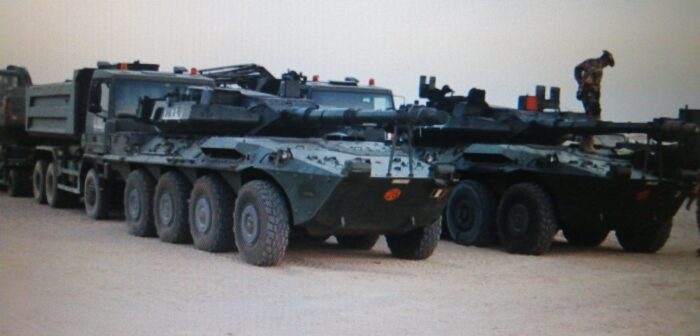
«The base was on alert and the personnel prepared for the worst. We contacted soldiers we knew at the entrance and what we already knew was confirmed: they invited us to go away and be careful when passing through the streets. We put on the bulletproof vests. With us was Marshal Iacobini who asked for explanations of our behavior and we told him that what they had told us in the afternoon had been confirmed».
The second Patrol Report on the state of alert is made. But the imminent return for the end of the mission scheduled for November 14 throws away the bad thoughts for a moment.
«On the morning of November 11, the Traffic Police command went to us and the worried colonel told us that it had been arranged by the top management that the bridges of the city on days 11, 12 and 13 would be one-way. Something was wrong. But we were told by the coordination center of the city of Cipihai that tests of the structures had to be carried out. After a briefing, the reinforcement of the Traffic Police and Local Police policemen on the bridges and near our Carabinieri Maestrale and Libeccio bases was arranged».
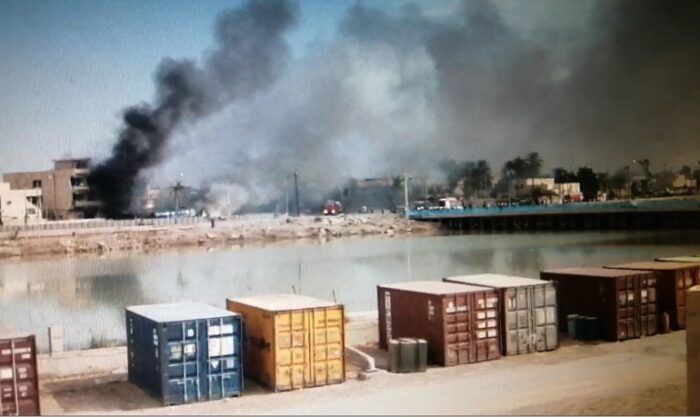
But the diabolical plan of Al Qaeda’s jihadist extremists had already entered the operational phase. «We all realized that the base was not adequately protected in relation to the various alarms prevented. It was known that a tanker had been released from seizure even if the type was not known. Then it was discovered that it had been parked on a street adjacent to the Euphrates, opposite the Maestrale base and no more than 200 meters away. When I told the important passages of the information collected on November 8 at the hearing before the Military Prosecutor’s Office and touched the one-way bridges button, I saw my nose turn up and I was attacked because they claimed that there were no Patrol Reports. Surely this testimony decreed my professional demise».
In 2006, the Court of Appeal of the Civil Court of Rome confirmed the thesis of the ignored alarms, condemning General Bruno Stano, commander of the Italian Army and of Italian Joint Task Force Iraq, to compensate the families of the victims but surprisingly acquitted Colonel Georg Di Paoli, then commander of the Carabinieri Regiment. The sentence was confirmed by the III section. of the Supreme Court on 09.10.2019.
A little more than fifteen days before the massacre, the SISMI had warned of an “attack in preparation within two weeks at the latest”, also specifying that there was a “Russian-made truck with a darker cab than the rest”, the judges wrote underlining ” the evident underestimation of such a timely and immediate alarm “. Although the reports came after the massacre of September 11, 2001, when Al Qaeda, along with his accomplices from Saudi Arabia and the deviant secret services, had demonstrated the ability to plan devastating attacks.
SERIOUS DISORDERS CONTESTED BY THE COMMAND
«In the days following the tragedy I was sent to the Hospital Medical Commission (CMO) of Cagliari for medical health checks where I was assigned 40 days of treatment and rest for knee problems due to a strong sprain that occurred on November 12 while I was looking for to remove Marshal De Rasis from inside the base, due to stress and inflammation of the mammary glands, subsequently removed, due to the excessive use of the drug Chlorichine in the operating theater, but I was not recognized the service case requested in 2004. I did not appeal for not having compromised the operational life since I had to leave for the mission in Kosovo».
But over time the situation worsens due to the trauma suffered and the excess use of Chlorichine included in the anti-malarial treatment plan and against the Whitefly that causes leukemia. «I took 500 mg per week for 4 months. I was diagnosed with gynecomacy but the CMO did not recognize the cause of my service because otherwise it would have had to recognize it to all the other soldiers sent on missions abroad with the same pathology».
The damage suffered by the explosion on hearing, back and lower limbs was devastating: «I developed hearing loss in particular in my right ear. Two herniated discs were formed due to the impact with the ground of the car thrown twenty meters away and the subsequent collision with the steering wheel. And finally a knee pain when they collided with the dashboard of the jeep».
Despite these serious conditions, the battle begins with expensive appraisals and legal advice to obtain compensation. «I realized that all the initial attention was gone and my ordeal was beginning. I realized that I was a “burden” and therefore I applied for a post at the command of the Military Police of the Sassari Brigade: but although available I was denied». Not only.
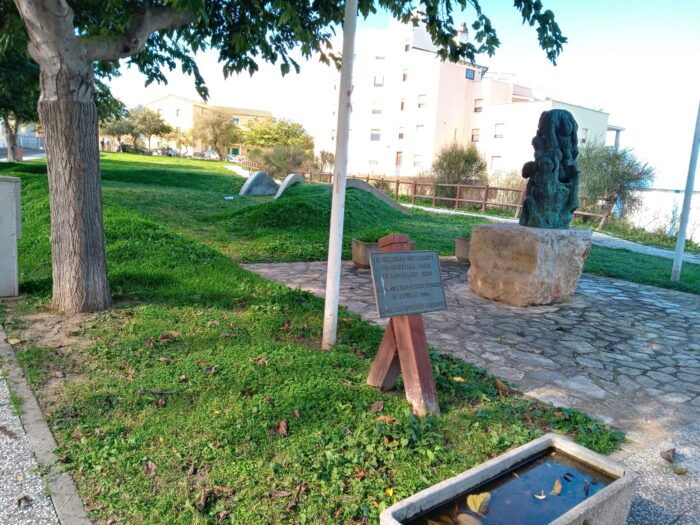
The corporal Sini struggles even to receive the permits to collect the prizes that the company has awarded him: the process for Honorary Citizenship granted to him by the Municipality of Porto Torres (Sardinia) began in 2004 and ended only on March 4, 2011, in 2006 receives the commemorative medal of the Italian Red Corce and then the Silver medal of the Order of Malta.
In 2004, the Berlusconi government tries to remedy the situation of widows and veterans involved in attacks and institutes law 206 with the new “Rules for the victims of terrorism, the mafia and this matrix”.
«On March 11, 2008, I was invited to the Chamber of Deputies to receive an award on the National Day in memory of the Victims of Tragedies, but they invented everything to deny me permission to participate. Given the insistence of the organization, they sent me to serve in uniform but I paid the consequences and persistence».
The final humiliation to the survivor-hero comes two years later. «On June 16, 2010, I was put on absolute leave, chastising and treating me as the worst soldier for severe, chronic post-traumatic stress disorder with difficulty in adapting».
In 2011, in the meantime, following the applications sent to the Ministry of the Interior for the recognition of the benefits of law 206/2004 «I was sent to the Hospital Medical Commission of Cagliari to be subjected to legal medical examinations with the recognition of the category and percentage of disability, which ended with category 8 and 25% of disability despite my biased advice had shown a more serious category between 3 and 4 equal to a disability between 65 and 80%».
A calculation that will prove to be fundamental in light of the additional benefits introduced by a revision of law 206/2004 in 2015 when all veterans with a disability greater than 50% (class 6 to go down) were recognized in addition to the compensation for the person concerned also a “special allowance” to family members given by the Ministry of Economy (MEF).
THE GOLD MEDAL RETURNED FOR DISPUTE
In February 2014, the chosen officer Sini, discharged with the rank of deputy brigadier by virtue of the law on victims of terrorism, finally receives the Gold Medal which certifies, in fact, his status as a war veteran and fills years of delays in the recognition of traumas also suffered to save injured comrades.
But as the process for recognizing his actual degree of disability proceeds slowly in the infernal machine of the Italian bureaucracy (disability pensions are often paid to civilians so late that they die in the meantime) he decides to make a sensational gesture.
On 1 April 2016, he went to the Prefecture of Sassari to return his Gold Medal as a sign of protest along with the honors of Knight of the Italian Republic. But the administration refuses it in the first instance. «In those days, the commander of the Sardinia Carabinieri Legion General Antonio Bacile was interested in the problem and he tried to help me and was then transferred to the peninsula». In 2017 his successor also struck the same fate so Sini took courage and fulfilled his intention that brought him to the front pages of all the newspapers in Italy.
«On the anniversary of the massacre, November 12, 2018, after realizing that all my signals of request for help were in vain, I went to the General Command of the Weapon where I delivered the honors».
But in addition to the damage, here is the insult that however contributed to throwing fuel on the fire of the controversy in all the Italian media. «On 4 July I was notified of an administrative act by the Prefecture of Sassari where, recalling a series of provisions, they asked me to recover 1,458.01 euros: the expenses incurred by the Ministry of the Interior for the minting of the medal».
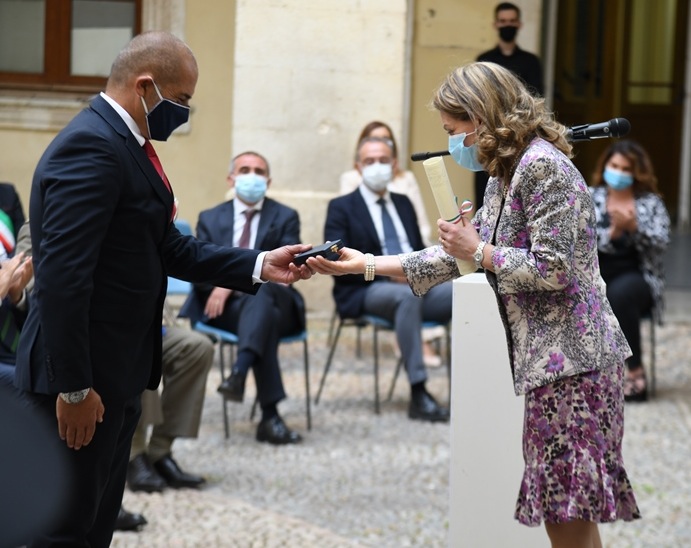
Diplomacy set in motion and tried to induce the deputy brigadiere to put an end to the dispute: «On 2 June 2020 the prefect of Sassari, Maria Luisa D’Alessandro, on the occasion of the Republic Day, handed me back the Gold Medal which Victim of Terrorism. I accepted it because my intent was to make it clear that I did not want to refuse the honor but rather draws attention to what was happening in relation to the deprivation of my rights and that of five other carabinieri in my contingent. Now the lawsuit is pending before the Labor judge of Sassari for recognition of the damage but also of the seriousness and aggravation because its real entity is too often underestimated».
Nassiriya, not to forget. Politicians and leaders of the Army act pompously on each anniversary of 12 November. But to worthily remember a massacre which is, moreover, most likely avoidable as other jihadists’ plots, it is necessary first of all to pay due attention to the rights of those servants of the Fatherland who died or suffered incurable psychophysical traumas to honor it on a mission. In fact, there is no more dirty and infamous rhetoric than that which celebrates the heroism of the military by forcing them to fight bureaucratic battles that are sometimes more suffocating than those experienced in war.
Fabio Giuseppe Carlo Carisio
© COPYRIGHT GOSPA NEWS
no reproduction without authorization
MAIN SOURCES
GOSPA NEWS – OSINT INVESTIGATIONS
GOSPA NEWS – JIHADISTS REPORTS



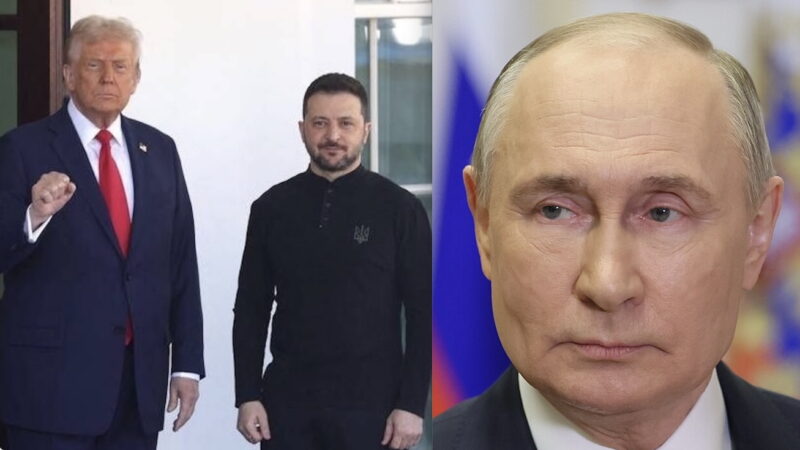
I am genuinely pleased to glance at this webpage posts which contains plenty
of valuable information, thanks for providing these information.